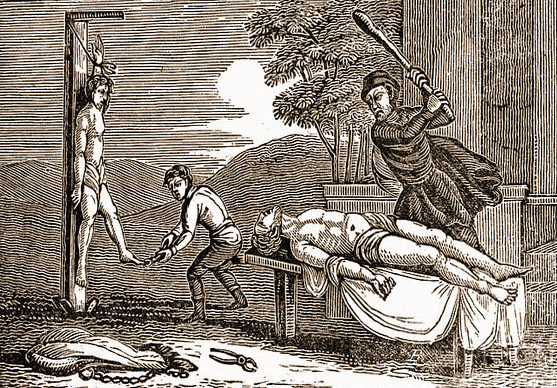Below, an abridged translation from the third volume of
Karlheinz Deschner’s Kriminalgeschichte des Christentums.
Most of the written statements about the martyrs are false, but all of them were considered as totally valid historical documents (4 of 7)
 Mar Jacob, the one tear into pieces, after the ten fingers of the hands and three of the feet have been torn off, smiling, makes deep comparisons: ‘Third toe, follow your companions and do not worry. For the same as the wheat that falls to the earth and in the spring makes your companions grow, you too will be reunited in an instant with your companions on the day of the resurrection’. Is not this well said? But after dropping the fifth toe, he cries out for vengeance: ‘Oh God, direct my punishment and make my revenge fall on the ruthless people’.
Mar Jacob, the one tear into pieces, after the ten fingers of the hands and three of the feet have been torn off, smiling, makes deep comparisons: ‘Third toe, follow your companions and do not worry. For the same as the wheat that falls to the earth and in the spring makes your companions grow, you too will be reunited in an instant with your companions on the day of the resurrection’. Is not this well said? But after dropping the fifth toe, he cries out for vengeance: ‘Oh God, direct my punishment and make my revenge fall on the ruthless people’.
Often these saints become rude and insult their impious torturers or judges according to all the rules of the religion of love; they augur them ‘gnashing of teeth for eternity’, insult them by calling them ‘impure, dirty, blood lickers’, ‘lewd ravens, who rest on corpses’, ‘a snake of a thirst-eater’, ‘greens’ of hatred ‘like a bad viper’, a lascivious looking for ‘women in the bedroom’, an ‘impure dog’. Saint Aitillah tells his executioner: ‘You really are an irrational animal’. And St. Joseph does not think precisely of loving his enemy, of offering him the other cheek. The writer says: ‘Joseph filled his mouth with saliva and suddenly spit on his face and said: “You, impure and stained, you are not ashamed”.’
After Mar Jacob had been cut one by one all fingers and toes, accompanied each time by a noble or poisonous sentence against the ‘butcher wolves’, he remains firm in the faith and ready for more torture. ‘Why are you lounging?’ he asks impatiently. ‘Don’t forgive your eyes. For my heart rejoices in the Lord and my soul rises up to him, who loves the mortified’.
Thus, after the ten fingers and toes, the executioner’s helpers systematically cut, with grinding teeth, new members and with each of those who fall, the holy man makes comments with a pious sentence. After losing his right foot, he says: ‘Every limb you cut off from me will be a sacrifice to the king of heaven’.
They cut off his left foot and he said: ‘Hear me, O Lord, for You are good and great is Your goodness for all. They call you’. They cut off his right hand and he shouts: ‘The grace of God was great with me; free my soul from the deep realm of the dead’. They cut off his left hand and he said: ‘Look, you did miracles with the dead’. They approached and cut off his right arm and he spoke again: ‘I want to praise the Lord in my life and sing hymns of praise to my God as long as I exist; He likes my praise; I want to rejoice in the Lord’.
The perverse ‘pagans’ cut off his left arm, tear off the right leg of the knee… and finally ‘the glorious’ is reduced to ‘head, thorax and abdomen’. Then he reflects briefly on the situation and ‘opens again the mouth’ to tell God a brief speech. It is already daring to talk in such a reduced state—he has lost everything for Him!:
Lord, God, merciful and compassionate. I beg you, listen to my prayer and listen to my pleas. Here I am without my members. I’m here in half body and I’m silent. I have nothing, Lord, I do not have fingers to implore you; nor have the persecutors left me hands to extend them toward You. They have cut my feet off, my knees have been ripped off, the arms are away, the legs are cut. Here I am before You as a destroyed house, of which only a crown of tiles remains. I beg you. Lord, God…
And at night the Christians stole the corpse, or rather, ‘picked up the twenty-eight dismembered members’ and the rest. And then fire fell from heaven that ‘licked the blood from the straw until the members of the saint blushed and became like a ripe rose’.
Acts of martyrs!
______ 卐 ______
Liked it? Take a second to support this site.
One reply on “Christianity’s Criminal History, 97”
This appears to be a poetic account of a martyrdom written long after the fact by a Christian named Mar Jacob, not a martyrdom of Mar Jacob. In any case, it’s fictive, and obviously medically impossible. Blood loss from such traumatic amputations would have quickly rendered the victim unconscious, and unable to utter any of these witty rejoinders. In the second volume of his Decline and Fall of the Roman Empire Edward Gibbon describes a slightly more plausible account, which he seems to accept as valid: